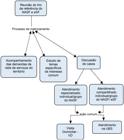Objective: the purpose was to identify the key tasks performed at two Family Health Support Centers (NASF) in São Paulo city, Brazil, and to understand how their professionals performed their activities to achieve their goals.
Methods: this case study was inspired by the Activity Ergonomics and the method of Ergonomic Work Analysis (EWA). Results: The findings show that the work at the NASF is characterized by variable tasks that are shared among the teams involved. Different organizational arrangements are adopted according to available resources as meeting space, participation in committees and groups, as well subgroups to represent the Center in these spaces. Productivity indicators used did not contemplate the tasks specificity. The financial and material resources are scarce to perform the tasks.
Conclusions: the NASF and the Family Health Team have to work together; however, there are significant differences that interfere with this partnership: priorities, work instruments, and management and activity models. The results demonstrate potentialities and challenges faced in the daily work and enable deeper knowledge on the reality of actions implementation related to public policies on primary health care.
ergonomics; work; health services; primary health care; public policies

 Thumbnail
Thumbnail
 Thumbnail
Thumbnail

